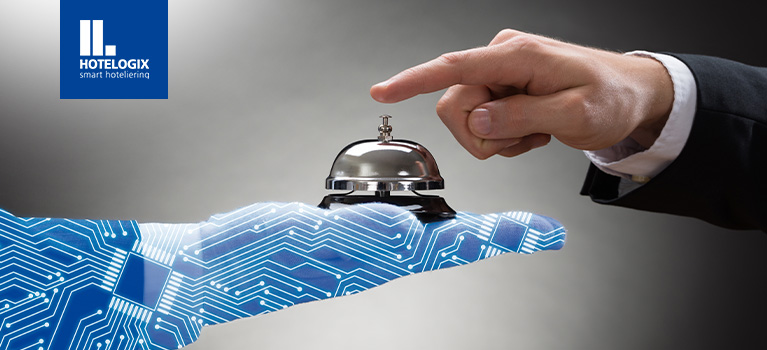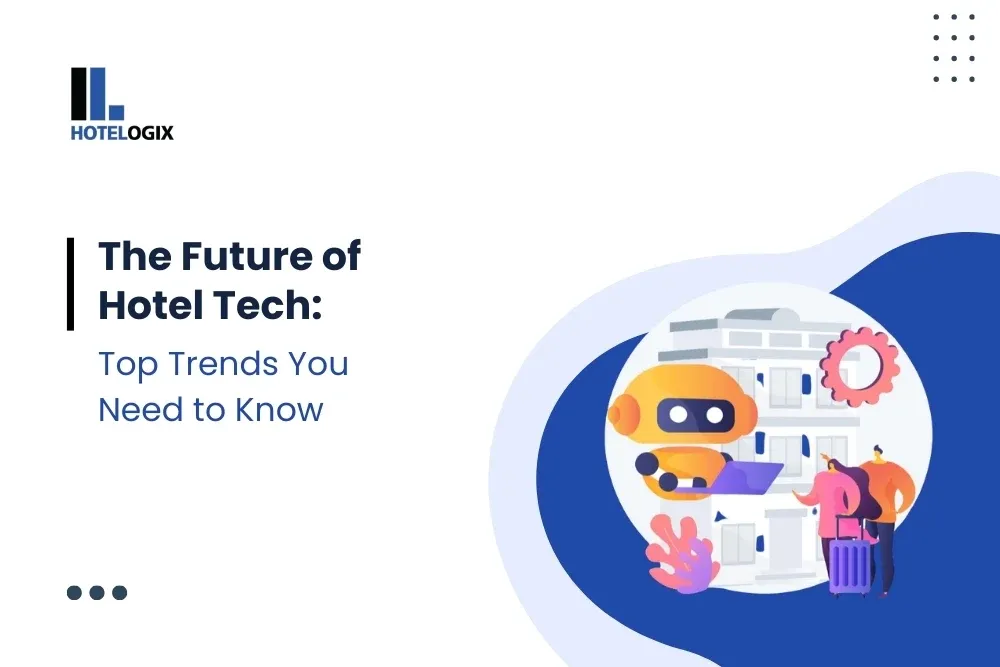We live in an evolving world, constantly upgrading itself to thrive in the challenging environments it finds itself in. If you are a hotelier or a hotel business owner who has managed a property in the past, you would know that the hospitality industry is always required and even expected to remodel itself to suit the needs of those whose patronage it enjoys. However, it is not advisable to make an abrupt switch from existing methods to new hospitality trends. Careful thought and planning must back such decisions which could have long-term repercussions on a hotel’s business. In this blog, we will take you through a list of trends in the hospitality industry such as the transition from a legacy hotel management platform to a cloud-based property management system (PMS) which you should consider in preparing your hotel business for the future and the many benefits that a PMS brings. So, what are the overarching hospitality themes to follow? Read on, to know more.
Rooms with smart controls:
The amenities provided to guests in a hotel room are increasingly becoming digital in nature and it has made a difference to the experiences that guests take away from their stay, in terms of convenience, efficiency and even luxury to some extent. Digital tech has become a feature at homes and therefore the expectation of their availability at hotels is only natural.
Guests want comfort and convenience tied into even the basic aspects of a hotel stay, such as push-button controls for temperature and concierge services, voice commands for lighting fixtures and so on. Most transformations of this kind do not require extensive changes and an experienced hotelier’s foresight would know how and when to pioneer efficient and timely implementation.
-
- Guests like to carry their own means of entertainment wherever they go, instead of depending upon what the hotels have to offer. Streaming devices which allow guests to take their bank of movies or shows with themselves are a huge hit.
- Most people want a release from the burdensome charging cords and are inclining more towards wireless charging devices which transfer charge to a device by simply placing them over a “mat”.
- In-room tablets have replaced the information booklets which were traditionally used in hotels. Guests want to have easy access to information and the power to control their stay experience too. This explains why they want to have room service menus, sight-seeing options, rate sheets of spa services, and so much more on their tablets.
- Guests seek calm and quiet during their stays and hotels are going an extra mile for them with sound-proofing acoustic technologies that help cut out the unwanted noise from their surroundings.
- It is now possible to meet guest demands for services such as housekeeping, laundry etc. by adopting systems made specifically for hotels, which allow guests to make requests simply by giving voice commands.
- Easy check-ins/out are now possible with technology such as keypad codes, which allow entry into a room just by punching in a code specific to every guest and mobile property management systems, such as the one offered by Hotelogix, which facilitate contactless check-ins/outs and eliminate the need to stand in long queues at the front-desk.
Greener Alternatives:
Travelers around the world, especially millennials, are more conscious about their impact on the planet they live in. They not only preach about environmentally friendly methods, but also diligently practice them, so much so that it has started to influence their decisions about where they would like to stay during their travels. Hotels are trying to meet these expectations by embracing ecological conventions like water conservation, plastic use, and wastage reduction, including substitutes to meat on restaurant menus etc.
Hotels have acknowledged that sustainability is the way forward and are therefore actively trying to integrate ecologically sound practices in all aspects of their business.
-
- Based on a hotel’s ecological standing in terms of efficient usage of water, quality of indoor environment, a LEED certification, known as Leadership in Energy and Environmental Design, can bestow a status such as – Gold, Silver, Platinum etc. to a property.
- A renewable source of energy such as Solar power is being used by hotels, either by installing solar panels at their properties or by purchasing it from their electricity providers. This not only helps hoteliers reduce their energy costs, but also enjoy tax rebates.
- Conserving water for a green future is crucial and hotels are taking steps to minimize the wastage of water at their properties, and not shying away from even the use of water conservation technology to meet their goal.
- Consumers have said a big ‘no’ to the use of plastic and have replaced single-use plastic with more sustainable alternatives such as steel straws, glass bottles, metal cutlery etc. Hotels are therefore doing their bit in cutting out their additions to plastic waste.
- Installing motion sensors which turn off power when movement is not detected for a certain time can help conserve energy.
- Following environmentally sound hospitality practices like the use of efficient, easy-to-operate cloud-based property management software like Hotelogix built with huge storage capacities and doing away with housekeeping services for credits or loyalty points can provide long-term benefits.
- Hotels can contribute to reducing the carbon footprint on earth by including more vegetarian and vegan options in their menu, instead of meat or dairy.
Choice of accommodations:
Travelers today have several options of accommodations to choose from. Ranging from hotels to hostels to serviced apartments and many more; it is now possible for property owners or accommodation providers to tap into audiences all over the world through the internet and the services available on it, such as the online travel agents (OTAs), which carry details about room rates, availability etc. and make it easy for customers looking for a stay to find an accommodation that suits their needs. Hotels can benefit by adopting a channel manager software like AxisRooms which ties to these online agents and carries out instant updates of information and negates the possibility of double bookings or over-bookings.
-
- People who travel solo or work remotely, sometimes require staying put at a single location for a brief period. In such cases, they opt for spaces where they can co-live with people of similar attitudes or goals, while sharing the living and working spaces. As remote working increasingly becomes a norm with the Covid-19 pandemic, people are also looking for spaces which they can utilize for work temporarily. Being a hotelier, you may have had to manage your hotel remotely as well. A property management system like Hotelogix which is also available in a mobile version is great when you do not have the liberty of being physically present on location, but still need to manage day-to-day operations. The app facilitates the creation of multiple user accounts, with a set of restrictions, unique to every user, which helps managers keep an eye on things too. Revenue managers at many hotels already work remotely and it looks like this trend is going to allow more of your staff members to follow suit.
- AirBnBs are gaining popularity amongst people, as they have extended from room rent outs at night to entire properties like hotel rooms, apartments, treehouses and more. They also have several more additions to their offerings like tours, adventure travel etc.
- Mobile hotels, which are basically self-driven hotel rooms, are the latest fad amongst travelers these days. Instead of searching for an accommodation, every time one travels, opting for a mobile hotel which travels along, is being preferred by quite a few.
- Hometels are a new kind of accommodation which combines the qualities of hotels and vacation rentals by mixing the standards, amenities and branding that comes with hotels.
- Hotels are looking to appear distinct from their counterparts and are seeking ways to provide their audience with an experience of the local culture, wherever they may be located, by introducing its character in some aspects of the hotel, such as its décor, food and beverage or even its overall personality.
Tech Saviors:
Technology has added refinement to processes related to the hospitality industry. From bookings to check-ins to reviews, everything is leaner and smoother with the use of technology in conducting these activities. Newer technology trends such as artificial intelligence and digital room keys, are being introduced constantly which means that hoteliers have larger opportunities of making their guest’s stays memorable.
-
- New technology increases the scope for hotels to indulge in upselling their offerings to their guests. Those looking for a more polished hotel stay experience are usually sold upgrades for rooms, transportation, food and even tour and travel packages. All this is also easily manageable with a hotel management software which organizes and streamlines guest related information for you and makes it readily accessible, even when you are on-the-go.
- Whether you are a small, medium, or big business, managing your revenue effectively should be your priority and investing in the right tools to accomplish that must be given importance. The latest in Property Management Systems come with built in capabilities to measure your financials and generate insightful reports based on historical data, market dynamics etc., which give you a clear idea about the price your hotel must charge for your services.
- Allowing your guests to bypass the long queues at your hotel’s front-desk, especially during the Covid pandemic, and check into their rooms through a mobile app or other contactless methods, such as those offered by hotel PMSs could be extremely favorable for your business in the long-run, as it adds to the overall customer experience.
- Training your staff to handle hotel operations, while complying to social distancing norms introduced with the arrival of the Covid pandemic might not be as difficult as it may seem. Hotelogix offers an Automated Coaching Engine, also referred to as A.C.E, which runs on artificial intelligence, and interacts with users to train them on hotel operations, without any human intervention.
- Hoteliers can boost direct bookings through their website by applying technology that ties to their website such as the web booking engine offered by AxisRooms which helps customers easily choose the number of rooms needed, their length of stay etc. and make instant bookings. Not only that, but it also gives customers an overview of the property and its amenities. Some A.I. based tools, by means of A/B tests, also help optimize the bookings received through a hotel’s website.
- Booking rooms with mobile phones is easy and convenient and that is what a growing number of people are doing. Therefore, it is imperative that a hotel’s website is as friendly to its users, specifically for bookings, as is the PMS they use to keep track of all the reservations/cancellations/payments etc.
- A high-speed internet facility might sound commonplace but is a prerogative for many guests these days. So, it’s important to ensure that your hotel offers a per second speed of at least 50 megabits.
- Robots might take over the world in the future, but that is uncertain. However, they have surely made their presence known in hospitality, especially in room services. Because the world is battling a pandemic, it might also make for a good measure, if hotels use more robot technology on the daily.
- Technology use in payments has made quick transitions from swipe cards to chips to near field communication (NFC) cards. Contactless payment methods are going to be hugely sought in the future, as hygiene and health concerns take center stage.
- Hotels are inclining towards open APIs or integrations with cloud server-based applications such as Hotelogix PMS. Applications with an open API have the ability to connect or integrate with other systems, without needing a customized connection.
- Automating tasks like night audits, which are time consuming and tedious, yet crucial for a hotel’s proper functioning can help hoteliers divert their attention to other important things. A hotel management system conducts a night audit automatically at the end of a day and streamlines finances for you, so that you do not have to do it manually every single day.
- Some hotel software providers like Hotelogix are offering a package that comes with more than just the PMS, such as a channel manager, a revenue manager, a web booking engine etc. and are hand-holding their customers to help them understand the tools, as well as configure and consolidate everything for their ready use.
- With guest information safely and securely stored and readily available through cloud-servers attached to hotel PMSs, hotels can utilize it to personalize the experience they offer their guests, which could help them in building lasting relationships with their customers.
- It’s important to be seen, before being chosen. A Meta-search engine is therefore important to hotels in ensuring that they are seen by people seeking accommodations and thereby receive more direct bookings.
Conclusion:
While it may not be possible to take up every trend that you see in the market, a hotelier must evaluate what his/her business needs and make an informed decision. However, adopting a Property Management System (PMS) seems like a good place to start, as it has the potential to bring you many benefits.




